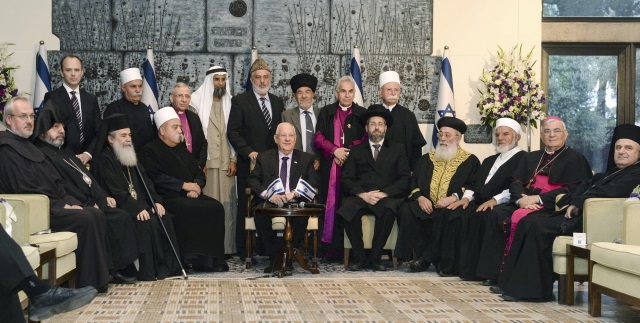President Reuven Rivlin and religious leaders from across the spectrum in Israel convened at the President’s Residence in Jerusalem on Wednesday to promote a message of calm and tolerance, especially ahead of the upcoming holiday season, which includes the Jewish Passover and Israel’s national holidays, which coincide with the Muslim month of Ramadan.
In an emotional call to the religious leaders of the various communities to work to reduce tensions, Rivlin convened a meeting of the Council of Faith Community Leaders in Israel, which was attended by Israeli Chief Rabbi David Lau, Chair of the Council of Muslim Religious Leaders Sheikh Mohammed Kaiyuan, Spiritual Leader of the Druze Community Sheikh Muwaffak Tarīf, Greek Patriarch of Jerusalem Theophilos III and other religious figures.
“This meeting is not ceremonial,” Rivlin said, “we are dealing here with human lives; with the blood that has been spilled, and with the blood that God forbid may yet be spilled. This is a moment of genuine crisis, and the obligation to avert the outbreak of violence which threatens the innocent, rests upon the shoulders of each and every one of us. Any incitement and utterance has the ability to ignite this entire region, and sadly our land is burning.”
Israeli security forces are bolstering their presence at potential flashpoints ahead of the holiday season, as Israel fears that Palestinian terrorists will renew their wave of attacks after a few weeks of relative quiet.
The IDF’s heightened level of alertness comes as the Palestinians issued threats against Israelis visiting the Temple Mount in Jerusalem during the Passover holiday.
“This place, to which we all belong, is bleeding from many long months of frustration and anger, from blind hatred and fear. Let us not delude ourselves, this place, our home, is engulfed in the flames of incitement some of which originates in the words of well known, and senior religious leaders, who purport to speak in the name of religious truth,” said Rivlin.
The leaders’ presence combatted the incitement and bloodshed and conveyed a positive message, he added.
The Israeli president noted that previous festive and joyous periods have more than once turned into “flashpoints of tension, friction, and violence,” and especially in Jerusalem, where “the tension has increased.”
He restated Israel’s commitment to the well-being of “all faith communities, and to the freedoms of worship and religion.”
“It is easy to turn Jerusalem into a place of conflict, yet it is our duty, the duty of all who love Jerusalem and believe in its holiness, to be insistent in condemning attempts to ignite the flames of religious war in Jerusalem,” he stressed.
Sephardic Chief Rabbi of Jerusalem Rabbi Shlomo Amar noted that the religious leaders, the “people of faith,” can prepare the groundwork for building peace. “We must convey this good will to all the public, so they will understand that we must talk together. We will gather our strength, and peace will guide us in love and friendship.”
Chair of the Council of Muslim Religious Leaders, Sheikh Mohammed Kaiyuan said there are around 400 Imams calling for “peace, reconciliation, and love.”
The meeting concluded with a joint statement by the Council of Faith Community Leaders in Israel which underscored the message of religious coexistences and peace.
“We hereby declare our commitment to the sanctity of life, and denounce all forms of physical or verbal violence against the innocent, in particular instances when such acts are committed in the name of religion, which are a desecration of the Name of God,” the statement read.
Ahead of Passover, Israel has relayed messages to Jordan and the Palestinian Authority, expressing its commitment towards preserving the status quo on the Temple Mount, Israel Radio reported. Israel said in its message that it is interested in quiet during the holiday period, and will not tolerate disturbances and provocations.
The Israeli government’s communications office, as well as the police and the IDF, have all been working to relay that message to the public and to Arabic-language social networks.
By: Max Gelber, United with Israel
